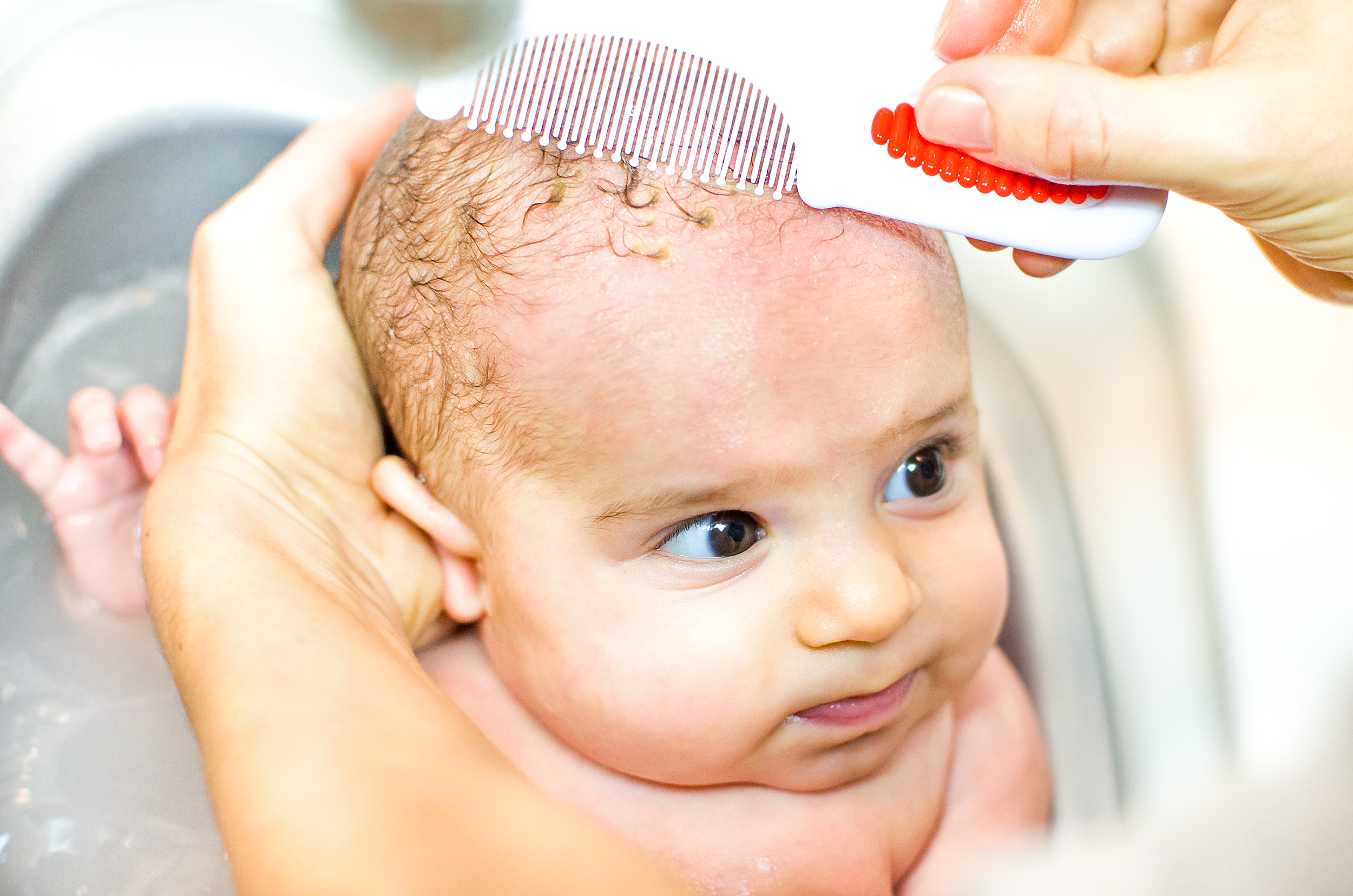-
How to Help When Your Partner is Having a Hard Time Breastfeeding

Father supporting mother who is about to breastfeed
The Gift of Breastfeeding
Breastfeeding is a wonderful gift to give a baby. By providing your baby with nutritious, natural breastmilk, your partner is protecting not only the baby’s health, but also her own. Breastfeeding helps keep the baby healthy, boosting immunity to help prevent infection and disease, and it reduces the mom’s risk of diseases like osteoporosis and certain cancers. By breastfeeding your baby, your partner is saving your family money, bonding with your little one, and boosting your child’s brain development. All of that is truly amazing, but it should be noted that breastfeeding is not always easy. In fact, for some women, it is not possible. What can you do to support your partner through this process and help her to reach her breastfeeding goals. We have a few suggestions.
Have the Right Attitude
Learn as much as you can about breastfeeding and take the stance that you and your partner are in this together. Sometimes, dads get jealous of the closeness of the mother and baby during this special time, or feel left out. Don’t fall into this line of thinking; there are plenty of things you can do with your baby! Avoid hovering, but communicate with your partner and let her know that you are there for her if she needs anything.
Understand the Issues
Breastfeeding is not for the faint of heart. It does not always come naturally, and sometimes there are real challenges, even when the mom has learned as much as she can and is eager to breastfeed. Sometimes the baby refuses the breast or bites, and other times there’s not enough supply to keep the baby well-fed and healthy. When there is too much milk, the breasts become engorged and sore. It can get very uncomfortable, in many different ways. Nipples can get sore and infected, milk ducts can become blocked, and mastitis or even breast abscesses can occur. Your partner can get support from a lactation consultant, her doctor, a nurse, or a midwife, but it’s also important for you to provide support as well.
Being There for Your Partner
Supporting your partner with breastfeeding starts in the hospital. Often, hospitals will push formula, and you may need to be your wife’s advocate and help her make her breastfeeding intentions clear. If your partner needs your assistance enlisting the help of a nurse or lactation consultant, be prepared to seek out the right person for her. At home, she’ll need you to step up your game around the house, taking on some extra chores so that she can have the time and space for breastfeeding. Offer to bring her a snack or some water, or an extra pillow, and help minimize distractions by removing pets and older kids from the room and limiting visitors. Understand that breastfeeding is physically demanding and help your partner to get some rest. Be aware that she may not want to be touched after a long day of caring for a newborn, and don’t be hurt if she is a bit distance. This is a short time in the grand scheme of things, and your lives will reach a new normal soon.
Bond with Your Baby
Just because the baby is breastfeeding, this doesn’t mean the daddy won’t have the opportunity to bond with this new little person. Cuddle your baby skin to skin or carry him or her in a sling or baby carrier. Offer to do bath time because this can be a wonderful way to bond. Settle your baby during fussy moments, which might be easier for you than your partner because you won’t have the smell of milk on your body to distract your baby. Offer to burp the baby or change the diaper after a breastfeeding session. Make the most of the times your baby is awake and alert, and spend time playing or walking with your child.
Be Supportive, No Matter What
For some families, breastfeeding goes smoothly and is a very rewarding experience. For others, though, it does not work out as well. Encourage your partner every step of the way, defending her choices to any naysayers and being there for her when she needs you. If breastfeeding does not turn out to be an option, be sensitive. Let her know that you don’t see this as a failure and you support her choices, no matter what.
Supporting Families and Helping Men
At the Center for Vasectomy Reversal, we love helping people grow their families. We pride ourselves on helping men improve their fertility through uncompromising, concierge-level patient care. Under the direction of Dr. Joshua Green, our team provides state-of-the-art treatment for men who need a reversal of their vasectomy or have other fertility concerns. To learn more, contact us through our website or call 941-894-6428. For additional parenting tips, we invite you to check out our other blogs!
-
Prostate Health Month

Prostate Cancer Awareness
September is Prostate Cancer Awareness Month
About one in 9 men in the United States will be diagnosed with prostate cancer during his lifetime, making it the second most common cancer, after skin cancer. Like many cancers, though, it can be treated successfully if detected early. In September, Prostate Cancer Awareness Month, and November, Men’s Health Awareness Month, we want to spread awareness to help men take better care of their health.
Prostate Screenings are Important
Men often get a little bit nervous about prostate exams, because the doctor must perform a digital rectal exam (DRE). This involves inserting a gloved finger into the rectum to feel the prostate’s surface, as well as examining the lower rectum and assessing the function of the anal sphincter. These exams are necessary, though, and people assigned male at birth should start having them around age 45 or 50, depending on their level of risk. In addition to the DRE, a prostate screening involves a PSA blood test, which measures the level of prostate-specific antigen in the blood.
What to Expect from a Prostate Exam
You don’t have to do much to prepare before a prostate exam, but you should let your doctor know if you have any issues like hemorrhoids, anal tears, or anal fissures. You’ll also need to abstain from sex for 48 hours before the exam, because ejaculation can cause your PSA levels to temporarily increase, and this can affect the test results. You don’t need to change your bathroom habits or be nervous if you haven’t defecated, because your doctor is used to this type of exam.
Doctors perform the two different types of screenings because, while a PSA blood test is very effective for detecting prostate cancer, the DRE can find cancer in people with normal PSA levels. During the DRE, your doctor will feel for lumps and bumps on the back portion of the prostate, where many cancers start. This exam only takes a few seconds, and while it may be uncomfortable, it’s not usually painful. The PSA is just a simple blood draw, sent to the lab for analysis. It only takes about a day to get the results, and if the PSA level is high, you may need further testing to diagnose prostate cancer, like a prostate biopsy, MRI, or other lab tests.
A Healthy Lifestyle can Help Protect Your Prostate
Prostate screenings are important for protecting your prostate health, because prostate cancer doesn’t always cause symptoms. They’re not the only measure you can take to keep your prostate healthy. Following these healthy living tips will help not only with your prostate health, but also with your overall well-being.
- Watch your weight. Prostate cancer is just one of the many health issues linked to obesity.
- Eat your veggies. Vegetables, especially dark, leafy greens, are important for prostate health. The vitamins and minerals found in foods like Romaine lettuce, spinach, kale, and broccoli are vital for a healthy prostate.
- Cut back on red meat. Heavy consumption of red meat can increase your risk of prostate cancer, but eating it on special occasions only will reduce your risk.
- Understand your risk. Talk to your doctor about your risk level; high risk groups include African Americans, those of Scandinavian descent, and people with a family history of prostate cancer.
- Get regular exercise. Exercising for 30 minutes a day at a moderate pace can have a preventive effect on many health issues, including prostate health.
- Drink plenty of water. The recommended amount of water for proper hydration is at least eight cups of water daily, and more if it’s hot or you’re very active.
- Manage your stress. Long-term stress weakens the immune system and alters your hormonal balance, increasing your risk of disease. Strategies like mindfulness and meditation can help with stress management.
- Don’t smoke. Smoking causes carbon monoxide to attack your red blood cells, increasing your risk of prostate cancer and other diseases. If you are having trouble quitting, talk to your doctor.
Center for Vasectomy Reversal Cares About Men’s Health
At the Center for Vasectomy Reversal, men’s health is our priority. We pride ourselves on helping men improve their health and fertility through uncompromising, concierge-level patient care. Under the direction of Dr. Joshua Green, our team provides state-of-the-art treatment for men who need a reversal of their vasectomy or have other fertility concerns. To learn more, contact us through our website or call 941-894-6428.
-
How to Pick Godparents

Godparents playing with Godchild
Picking Godparents: A Weighty Decision
When you’re having a child, there are so many decisions to be made. How will you decorate the nursery? What will you name your new little one? But one of the most important decisions you’ll make is the choice of godparents. What is a godparent? For some people, it’s a religious designation, but it doesn’t have to be. A godparent is an adult friend, an adviser, and another person in the child’s life to serve as a watchful eye and listening ear.
What does godparent mean to you?
In Christianity, a godparent acts as a sponsor when a baby receives the sacrament of Baptism into the family’s faith. Traditionally, parents would choose two godparents who share their faith, to help the child grow and be strengthened in the knowledge of God. Families who are not religious can still choose godparents, just to give their child good adult role models and further support in life. In this case, parents can pick as many godparents as they want. Godparents may be a strong religious force in a child’s life, or they may just be a source of love and support for the family.
Are godparents legal guardians?
It’s a common misconception that godparents are assigned to take custody of the child if something happens to the parents. This is not the case, though you can specify in your will that your child’s godparents will take this role. The act of making them godparents does not, in and of itself, designate them as guardians. It’s more about choosing someone who shares your sensibilities, to help you guide the child through life.
Choosing Godparents
In the Catholic church, the rules regarding godparents are strict. Godparents must be chosen by the parents or guardian, cannot be the child’s mother or father, and must be at least 16 years old. They must be Christians, and at least one must be a Catholic. Outside of the Catholic church, however, the choice is pretty much up to you as a parent. Choose carefully, because this is as much a responsibility as it is an honor. Think about the attributes this person has that you’d like to see passed along to your child. Consider how their influence will affect your little one as he or she grows to adulthood. Look for someone who is a permanent fixture in your life, someone reliable, who you would trust to pass along your beliefs if you were gone. When you’re narrowing down your list, talk seriously with potential godparents, making sure each is aware of your expectations. Don’t let peer pressure or family politics come into play; choose the people you believe will be the possible godparents for your child.
How to Ask Someone to Be a Godparent
Again, when you are a member of a Catholic Church, there are more requirements. Some parishes require a letter of recommendation from the godparent, along with documentation of their church membership and their understanding of this important role. If you are not a Catholic, you have a little bit more flexibility, but it’s nice to ask before the child s born. Look for a way to make the moment memorable, perhaps with a heartfelt card or personalized gift.
Celebrating with the Godparents
The sacrament of Baptism is a celebration in and of itself, but the birth of every baby is a celebratory event! There is no one way to mark the occasion, so you have near endless opportunity to make it uniquely you. A party in which you welcome your new little one into the world and honor the people you’ve chosen to be godparents can be a fun and memorable event, but there are other ways to observe this important moment, too. You could plant a tree with the godparents or bury a time capsule for the child to find in a decade or two. You might also ask the godparents to write letters to the baby for the child to read later in life.
Bringing New Life Into the World
The birth of a baby is a joyous and momentous event, and we at Center for Vasectomy Reversal love having the opportunity to help people grow their families. We pride ourselves on helping men improve their fertility through uncompromising, concierge-level patient care. Under the direction of Dr. Joshua Green, our team provides state-of-the-art treatment for men who need a reversal of their vasectomy or have other fertility concerns. To learn more, contact us through our website or call 941-894-6428.
-
What is Cradle Cap?

What is on your baby’s scalp?
It happens to most new parents, and it can be disconcerting. You’re snuggling your sweet new baby, inhaling that delicious baby smell, when you notice something a bit, well, icky. Red scaly or crusty yellow patches disrupt the sweet softness of your infant’s scalp, blotch your baby’s beautiful face, or appear in the diaper area. What is that? It’s cradle cap, and here’s what you need to know about it.
Cradle Cap is a Common Condition
Cradle cap is scientifically known as seborrheic dermatitis, and it can develop when a baby is between two and 12 months old. Generally, it starts on the scalp, as red or yellow patches that are greasy, scaly, or flaky, but it can also start on the face or in the diaper area, armpits, or any other place where the skin folds and creases. In creases and folds like the neck or behind the ears, it appears red and moist. It may look uncomfortable, but it doesn’t typically bother infants. Unlike atopic dermatitis, it is not itchy.
Causes of Cradle Cap
No one really knows what causes cradle cap, but it’s probably more than one thing. Oil buildup in the oil glands and hair follicles, combined with yeast found on the skin, play roles in its development. It is also thought that hormones passed along from the mother to the child before birth can contribute to the formation of cradle cap. What is known is that it is not the result of poor hygiene, and it is not contagious. A doctor can diagnose cradle cap by looking at it, and it will generally get better whether it’s treated or not. However, you might want to treat it, just to get those scales off of your baby’s scalp.
Treating Cradle Cap
Sometimes, cradle cap can be prevented with daily hair washing. Wash your baby’s scalp with a mild, tear-free shampoo, and remove the scales with a soft brush or toothbrush. If the scales are too stubborn for gentle shampoo, try a bit of baby oil, mineral oil, or olive oil, allowing the oil to soak into the scales so that you can loosen them with a soft brush. Once you’ve done that shampoo as usual. Be careful not to use any shampoos with nut oil on a child under five years of age.
Does cradle cap require a doctor visit?
If the cradle cap won’t clear up with regular shampooing, you might want to ask your pediatrician for help. He or she might recommend a mild steroid cream or antifungal shampoo, or a cream for parts of the body other than the scalp. Don’t use any over-the-counter anti-seborrhea shampoos, steroids, or antifungal creams on your baby without asking your doctor first. In some cases, seborrheic dermatitis in skin folds or the diaper area can get infected. If you notice signs of infection, like warm, red skin or fluid draining, call the pediatrician. Usually, though, cradle cap and seborrheic dermatitis clear up by 12 months of age, but may come back during puberty as dandruff.
Healthy Babies Start with Healthy Parents
At the Center for Vasectomy Reversal, we love helping people grow their families. We pride ourselves on helping men improve their fertility through uncompromising, concierge-level patient care. Under the direction of Dr. Joshua Green, our team provides state-of-the-art treatment for men who need a reversal of their vasectomy or have other fertility concerns. To learn more, contact us through our website or call 941-894-6428. For more parenting tips, click on the link to our blogs!
Recent Posts
Popular Posts
categories
- Uncategorized
- Sperm Retrieval
- vasectomy reversal
- Emergency
- Dr. Green
- sperm count
- fertility
- male infertility
- MESA
- medical care
- low sperm count
- IVF
- male fertility testing
- anesthesia
- pregnancy
- sperm aspiration
- semen analysis
- post-vasectomy pain syndrome
- infertility
- VE
- anti-sperm antibodies
- older dad
- general anesthesia
- gender reveal party
- post-operative infections
- baby name
- parent
- baby's first year
- fertilization process
- spinal anesthesia
- ACS Fellow
- nutrition tips
- concierge-level care
- fertility planning app
- azoospermia
- out-of-town patients
- V-V
- post-vasectomy reversal
- conceiving
- vasectomy
- vasoepididymostomy
- smoking
- sperm quality
- baby registry
- infographic
- surgical care
- surgical consultation process
- prostate cancer
- baby gender
- family time
- COVID
- Baby Shower
- Child Care
- Halloween Costume Ideas for Babies
- Halloween
- Halloween Safety Tips
- Celebrity Infertility Spotlight
- Postpartum
- testosterone
- Father's Day
- Father
- Men's Health
- Thanksgiving
- Pregnancy Announcement
- Parenting Tips
- Sperm
